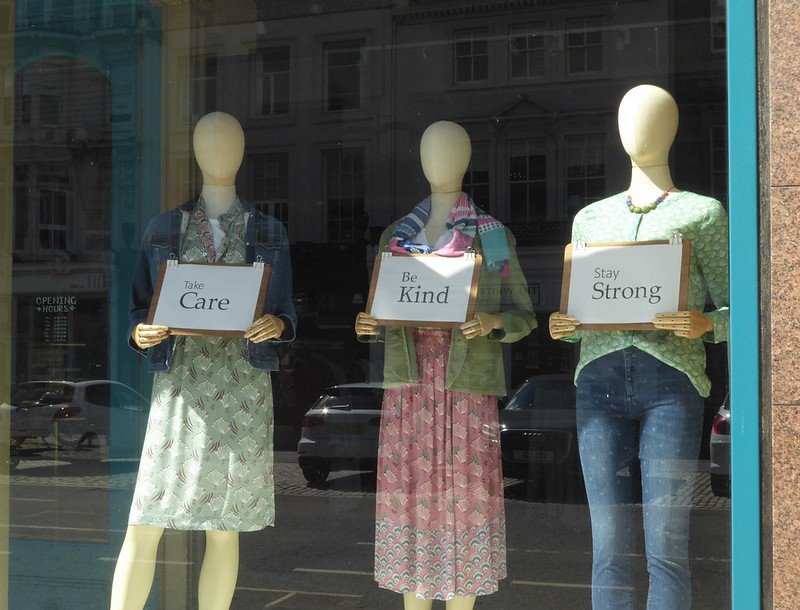Feature: Covid in Scotland in 2021
Covid has been unprecedented. As new cases of the Omicron variant emerge globally, and the pandemic engulfs Europe, the anticipated infections and deaths from Covid and are likely to rise across Scotland this winter. Amidst all this, our society is gripped by fear and anxiety, struggles talking about death, inflation rises while unemployment and poverty levels have increased and the most vulnerable are the most prone to the virus. It is clear from the data that Covid-19 is now part of our everyday life but there is plenty to demonstrate that living through a pandemic also provides opportunities for profound change in our communities.
Image credit: John Perivolaris | Flickr
By the end of November 2021 Scotland had registered a total of 12,127 Covid-19 deaths. In a small country like Scotland who has a population of just over 5.46 million we have started to feel the long term impact of the virus on our health, economy and society. Even with one of the most successful vaccination programmes in the world and now with the booster vaccinations under way the risk of the virus is not over. The data shows that the rates of hospitalisation and deaths have been weakened by the vaccine but not completely broken.
In the Chinese language, the word 'crisis' is composed of two characters, one representing danger and the other, opportunity, It is the latter we need to remember, where the suffering, resilience and sacrifice can be transformed into perseverance, care, justice and opportunity for all.
The Scottish Government has announced specific funding of £300 million to support the winter pressure, however for the possible scale of the resurgence of Covid-19 cases will unfold in the next few months.
According to Public Health Scotland, older people are still the most impacted and are being admitted in hospitals, the proportion of newly reported cases has reduced in recent months. The communities most vulnerable and high risk are situated west of Scotland and in rural areas, including Dumfries and Galloway, North/South/East Ayrshire, Renfrewshire, Inverclyde, West Dunbarntonshire and Eilean Siar.
Although older people are most vulnerable, the pandemic has continuously shown us a reflection of our polarised society. Based on Scottish evidence from late 2020, young people over age 18, young disabled people and young carers continued to report consistently worse physical and mental wellbeing. LGBTQ groups have reported a more noticeable increase in mental health issues, particularly in Black LGBTQ+ young people.
High levels of reported loneliness, in which almost 45%, around half of people reported feeling lonely. Older young girls in particular reported more feelings of loneliness, sadness, anxiety, and worry. Disproportionate impact of the pandemic on the wellbeing and experiences of young minority ethnic people show a sharp decline in their physical health and that they were less happy being back in school. Additionally, there has been a sharp increase in the reports regarding abuse of children in which both physical and psychological abuse have been prevalent.
These are only a handful of the covid-19 wider impacts but it is important that we as a society work together to build resilience, learn to develop compassion towards the vulnerable and become aware of the commonalities between community groups.
Image credit: kaysgeog | Flickr
A report published by Royal Society of Edinburgh’s Post-Covid-19 Futures Commission sheds an encouraging perspective on reimagining Scotland. It shows the positive impact of togetherness; power of co-creation between communities and developing strong cross-cultural learning, which can work across different sectors and countries. The Covid pandemic is a collective opportunity for us to reflect and do things differently.
Even though in the month of November the trend of hospital admissions was decreasing, this trend is now increasing with the emergence of Omicron variant and we are seeing restrictions applied to control this new wave. This up and down level of uncertainty is part of our ‘new normal’ and shows that as a global community we continue to be vulnerable, challenged and tested. Nevertheless, the response from Scotland as highlighted different ways we can build a more inclusive society and encourages each one of us to be a responsible citizen.
Perth and Kinross Council were leading on the volunteer front and the pandemic showed a powerful resource. The cohort of volunteering teams enabled communities to break down barriers, learn about each other and provide support in times of uncertainty. Another successful example has been the development Culture Collective, which uses a holistic and collaborative approach to provide a shared resource for artist and communities across Scotland.
Scotland has the tools and is a significant player in leading that change globally, and as a society we need to work collectively to imagine a Scotland that is more democratic, inclusive and participatory.



